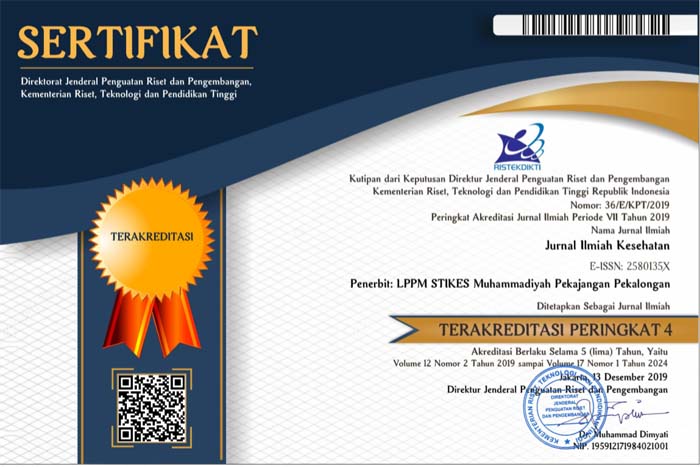Hubungan Jenis Kelamin, Usia dan Lama Paska Stroke Terhadap Fase Kehilangan
DOI:
https://doi.org/10.48144/jiks.v14i2.1609Keywords:
Grieving phase, sex, age, a long time post strokeAbstract
Abstrak. Stroke adalah suatu kondisi kerusakan sistem syaraf yang tiba-tiba sebagai akibat terhentinya suplai darah yang mengandung oksigen ke otak. Stroke merupakan salah satu penyakit yang memiliki dampak signifikan terhadap kesehatan dan kualitas hidup individu. Seerangan apopleksi pada stroke terjadi ketika aliran darah ke otak terganggu, baik karena pembuluh darah pecah (stroke hemoragik) atau karena pembuluh darah tersumbat (stroke iskemik). Kerusakan sel otak dapat terjadi secara cepat, bersifat ireversible dan menyebabkan berbagai gejala, termasuk kelumpuhan, kesulitan berbicara, gangguan koordinasi, gangguan memori dan sensoris bahkan dapat menyebabkan kematian. Prevalensi stroke di Indonesia mencapai 10,9 per mil, dimana Propinsi Jawa Tengah memiliki prevalensi stroke mencapai 11,80% dan di Kabupaten Pekalongan . Penelitian ini bertujuan untuk menggambarkan dan mengetahui hubungan jenis kelamin, usia dan lama menderita paska stroke terhadap tingkat kehilangan penderita paska stroke. Metode penelitian cross-sectional digunakan dalam mengumpulkan data primer responden secara langsung terkait variabel penelitian. Penelitian di Wilayah Puskesmas Buaran Kabupaten Pekalongan, dengan besar sampel 46 responden dimana hasil uji statistik Kendall’Tau menunjukan hubungan yang kuat lama pasca stroke terhadap fase kehilangan, dengan p value 0,001 dengan nilai kekuatan hubungan -0,595. Kelompok responden yang lebih dari satu tahun mengalami paska stroke masih menunjukan fase kehilangan tahap awal (denial dan angre) kondisi tersebut dapat dipengaruhi oleh berbagai macam faktor yang tidak di teliti seperti kehilangan pekerjaan, perubahan peran dan disabilitas fisik.
Kata kunci : Fase kehilangan, jenis kelamin, usia, lama pasca stroke
The Relationship of Sex, Age and Length Post-Stroke to the Loss Phase
Abstract. A stroke is a sudden damage to the nervous system resulting from the interruption of oxygen-containing blood supply to the brain. It is a diseases that has a significant impact on an individual's health and quality of life. An apoplectic attack during stroke occurs when the blood flow to the brain is disrupted, either due to a ruptured blood vessel (hemorrhagic stroke) or a blocked blood vessel (ischemic stroke). Brain cell damage can occur rapidly and irreversibly. Besides, it can lead to various symptoms, including paralysis, speech disorder, coordination problems, memory and sensory disturbances, and even death. The prevalence of stroke in Indonesia in 2018 was 10.9 per thousand, with Central Java having a stroke prevalence of 11.80%, particularly in Pekalongan Regency. This study aimed to describe and investigate the correlation between gender, age, and the duration of post-stroke suffering with the level of post-stroke loss. A cross-sectional research method was employed to collect primary data directly from the respondents related to the research variables. The research was conducted in the work area of Buaran Public Health Center, Pekalongan Regency, with a sample size of 46 respondents. The results of the Kendall's Tau statistical test showed a strong correlation between the duration of post-stroke and the loss phase, with a p-value of 0.001 and a correlation strength value of -0.595. A group of respondents experiencing post-stroke conditions for more than a year still exhibit the early-stage loss phase (denial and anger). This condition can be influenced by various unexamined factors such as job loss, role changes, and physical disabilities.
Keywords: Grieving phase, sex, age, a long time post stroke












